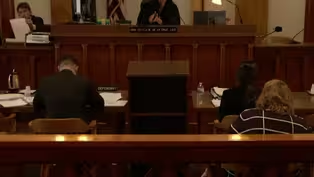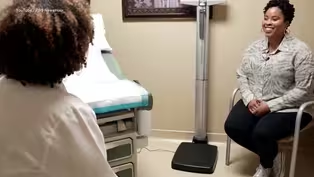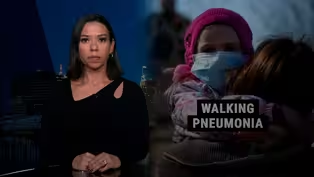NJ Spotlight News
NJ Spotlight News: November 21, 2024
11/21/2024 | 26m 45sVideo has Closed Captions
Watch as the NJ Spotlight News team breaks down today’s top stories.
We bring you what’s relevant and important in New Jersey news and our insight. Watch as the NJ Spotlight News team breaks down today’s top stories.
Problems playing video? | Closed Captioning Feedback
Problems playing video? | Closed Captioning Feedback
NJ Spotlight News is a local public television program presented by THIRTEEN PBS
NJ Spotlight News
NJ Spotlight News: November 21, 2024
11/21/2024 | 26m 45sVideo has Closed Captions
We bring you what’s relevant and important in New Jersey news and our insight. Watch as the NJ Spotlight News team breaks down today’s top stories.
Problems playing video? | Closed Captioning Feedback
How to Watch NJ Spotlight News
NJ Spotlight News is available to stream on pbs.org and the free PBS App, available on iPhone, Apple TV, Android TV, Android smartphones, Amazon Fire TV, Amazon Fire Tablet, Roku, Samsung Smart TV, and Vizio.
Providing Support for PBS.org
Learn Moreabout PBS online sponsorshipAnnouncer: Major funding for New Jersey Spotlight News is from NJM, and by the PSEG foundation.
>> Tonight, a pattern of abuse.
The Trenton Police Department is under fire after a damming report detailing repeated civil rights violations and use of excessive force.
Plus, as cases of walking pneumonia continue to spike among children in the state, what symptoms should you look for?
>> You are talking about a cough, potentially fever, running nose, sore throat, and chest pain.
Those are often because of the amount of coughing.
>> Also, prison reform and an effort to reduce prison populations.
Advocates push lawmakers to end mandatory sentences for nonviolent drug offenders.
>> These reforms are fair.
They are appropriate.
And to be honest, I have a hard time understanding, if you put politics aside for a moment, how anyone could disagree with it.
>> And local and state officials are making preparations for the 2026 World Cup, anticipating a significant influx of tourists throughout the tri-state area.
>> We want people to come here and we want our own communities to have a good experience.
>> "NJ Spotlight News" begins right now.
♪ Announcer: From NJPBS Studios, this is NJ Spotlight News with Briana Vannozzi.
Raven: thanks for joining us on this Thursday night.
I am Raven Santana in four Briana Vannozzi.
We begin with top headlines.
First, a stunning report from the U.S. attorney for the district of New Jersey, detailing a laundry list of alleged civil rights violations by the Trenton Police Department.
The U.S. attorney says the investigation which started in October of 2023 found a pattern of unlawful excessive force when officers faced little or no danger, as well as deficiencies in training, supervision, and policy inside Trenton PD.
He cites examples of officers escalating encounters including a 2023 stop when officers stomped on a man's head multiple times, kneeled on his head, and kicked him in the shoulder.
All after the man was arrested using reasonable force.
The report also identifies a pattern of officers stopping and arresting pedestrians without probable cause.
Salinger recommends more than two dozen changes, including improving use of force policies, requiring all stops to be recorded on body worn cameras, and addressing outstanding misconduct complaints and implementing de-escalation training.
Also tonight, all eyes were on Governor Murphy at the league of municipalities conference, who gave a keynote speech as the conference wrapped up this afternoon.
The Governor started his speech by honoring the legacies of Bill Pascrell and Donna Payne Junior.
Both passed away this year.
He highlighted the importance of affordability and economic progress for New Jersey as we head into 2025.
The governor promising to support municipal leaders in his last year, stressing the importance of providing grants for affordable housing and emergency response, expanding pre-k across the state by adding more than a thousand seats to Jersey classrooms, noting the state also makes full payment into its pension statement -- its pension for the fourth consecutive year.
He noted his commitment to training the workforce and artificial intelligence by launching a new website offering personalized training for any public sector worker, free of charge.
Governor Murphy: After a pandemic, supply chain disruptions, inflation, full on wars -- our families are still being battered by high costs.
This is not news to anyone.
But it is a reminder that we cannot slow down for a second when it comes to delivering real economic progress for New Jersey.
Raven: The conference also drew some criticism for those who work in casinos.
The group gathered outside to urge Governor Murphy and New Jersey lawmakers to pass protections for casino workers, like closing a loophole that allows smoking on casino floors, and ban smoking altogether.
Casino workers have sought relief for years through the legislature and the courts, have so far fallen short of getting the change they want.
The group says that coworkers have been forced to battle cancer, heart disease, and other illnesses due to exposure to toxic air in the casinos.
Workers accuse Governor Murphy of not doing enough to protect their health or livelihood.
The governor has said he would sign the bill if it reaches his desk.
The legislation has faced pushback from casino and business lobbyists, who argue a smoking ban would hurt the bottom line for New Jersey casinos, send customers to other states, and negatively impact the state economy.
The lawsuit brought by casino workers in April has stalled after a judge in August refused to issue an order that would have banned smoking in casinos.
As we reported last night, walking pneumonia, or eight watt -- a mild form of lung infection, is spiking, especially among children.
With the holidays coming, there are concerns about the rising number of cases.
Many people may have the illness and not realize it.
Often mistaken for a cold or the flu, the respiratory illness is treatable with antibiotics.
New Jersey hospitals have seen an uptick in emergency room visits and admissions, mirroring a national trend.
In Montclair State University professor's own daughter was diagnosed just last week.
To discuss more on her own experience and what symptoms to look out for to keep your family and friends safe, she joins me now.
Stephanie, thank you for joining me.
I know you know firsthand about the dangers of walking pneumonia.
After Dora was diagnosed last week, how is she doing?
>> In recovery.
They did a round of antibiotics.
Seems to be on the mend.
Unfortunately, many people, the cough is lingering.
Raven: Walk us through some of the symptoms that often go mist because it can be confused, from what I understand, with the common cold or flu.
>> The symptoms are essentially almost identical.
You were talking about a cough, potential he a fever.
A runny nose.
A sore throat and chest pain.
Those are often because of the amount of coughing.
For most people, it presents as a common cold.
They are out there living their lives.
That is why it is called walking pneumonia.
It really is not until -- if people have access to medical care, they go in to get an official diagnosis or to get tested.
Or if it progresses to a more severe illness, often in people with pre-existing conditions like asthma, that it really gets diagnosed and potentially treated.
Raven: We know it is treatable.
But it can also become dangerous.
How do we treat walking pneumonia and really prevent it from becoming dangerous?
>> Walking pneumonia is caused by a bacteria.
Most antibiotics are going to work.
We have some very effective ones that do work.
That is the best way of preventing it from getting worse.
The other key is if your child -- and this is typically amongst children right now -- is showing signs of respiratory distress.
If the cough is worsening in any way and you have access to health care, you will want to see your physician to ideally get that diagnosed and get on the treatment.
Unfortunately, what we are also seeing right now is that children who are living closer to poverty, poor children and people without access to health care, are the ones who are suffering most because they do not have access to a physician or to prescription medication.
Raven: Can it become deadly?
>> Yes.
In about 5% to 10% of cases, you can require hospitalization.
That usually is a pretty small number.
Unfortunately, as cases go up, the number of those cases will also grow proportionally.
We want to be mindful about the spread.
I know nobody is going to want to hear this, but it is a respiratory illness.
What we know works for other respiratory illness -- staying home if you can -- wearing a mask if you have to go out -- is the best way to prevent it getting spread to other people who are more immunocompromised.
Raven: We know this is a national trend but in New Jersey there are reports from emergency room's that are seeing a rise in cases.
How bad is it and why is it impacting a large number of children?
>> Nationally, we have seen the hospitalizations and the rates go up from about 1% for children who are 2 to four to as high as about 7%.
We have seen approximately in -- a doubling in children who are age five to 17.
One of the reasons we see this most commonly in children is because children are in congregate settings such as school and they are coming in contact with a lot of other people.
Windows are closed at this time of year, as the weather is not good.
They are spreading it to one another.
Most of the time, you don't feel badly enough that you would necessarily stay home.
They are not having a fever necessarily.
We are sending them to school and they are spreading it.
The danger for them also becomes that they are now coming back home to families that might be multigenerational.
He might have somebody that is at higher risk for more severe illness.
We really need to think about preventing the spread using the tools that we know work.
Raven: Stephanie Silvera, always great advice, especially as we head into the holiday season.
Think you for joining me.
It could get easier to raise a baby here in Jersey.
That is because on Monday Governor Murphy signed a bill that will require pregnant patients to receive personalized postpartum care plans as part of prenatal care.
Bipartisan legislation is in an effort to reduce preventable maternal mortality and enhance women's overall health, especially for women of color.
According to a statement on maternal mortality, like women are nearly seven times more likely to die while pregnant -- Black women are nearly seven times more likely to die while pregnant or in the postpartum period than white mothers.
The bill would help moms reach care even after the end of pregnancy.
>> It looks like, based on this bill, they are looking at the mother and the family from a more holistic perspective.
>> The bill was just signed into law by Governor Murphy on Monday, requiring maternal health providers create a postpartum plan with every patient who is expecting a baby, during the early part of the pregnancy.
It is in early weeks right after a baby is born that mom is most likely to experience life-threatening complications -- even death -- and issue the state has been working to reverse.
>> There are times where even though everything went completely normal in labor and delivery there are times when things can go awry postpartum.
The bill which had bipartisan support would first establish a care team for the patient, including pre-follow-up appointments, breast-feeding guidance, a plan forked from contraception, information about any pregnancy complications the patient has experienced, along with signs and symptoms of any mental health concerns that may arise postpartum.
Other options include the floor support or any other physical or mental health needs that may arise.
It's the bill is designed so that people have a plan in place before they leave the hospital, the birthing center, wherever they have delivered, so that when they get home and they have that baby and questions arise, they have tools and they have a plan in place to know what to do.
>> Maternal health providers say a critical piece of creating a care team is identifying people at home who will be helping monitor the mom in those early days after delivery, to identify any concerns.
Too often, it is in those early weeks when signs and symptoms are missed.
>> We can tell patients to look out for certain signs and symptoms, with the folks who are surrounding them on a day to day basis are probably more poised to see changes or to recognize, you know, signs and symptoms.
>> I think this bill sympathize the other outside factors that impact how people receive postpartum care.
Structuring it this way is a good start.
But I think there are still a lot of other issues that really impact access that need to be addressed as well.
>> Dr. Harris says chief among them is the trust that needs to develop between patients and providers to make a plan effective, and that has been a problem reported by many moms of color in New Jersey, who also have the highest death rates.
>> We are putting it back on the organizations where there has not been a great relationship to begin with, to center what should happen in the postpartum period.
We know a large number of black women experience disrespectful care over the course of their pregnancy, so they are not returning to have this conversation.
>> Harris also wants to see more community organizations included to bring more equity to underserved communities.
But even for those who do intend to keep their follow-up appointments, the timeline in New Jersey right now is six weeks postpartum.
Do you think we need to see legislation that requires an earlier office visit for this moms?
>> I would say -- for postpartum moms.
>> The recommendations is not a six-week visit, but a three-week visit.
I have seen some change in that.
It is a little inconsistent with how many people actually get that three-week visit.
Also, there has to have been a good relationship prior to that three-week visit.
>> The American College of obstetrics and gynecology.
The very act of creating this plan together could help build trust between providers and patients.
>> If they are actually taking a genuine interest and -- in how these mothers and families are actually doing.
>> The state has not released any new maternal health data since 2018, so it is hard to measure what changes are having any impact.
Raven: The New Jersey criminal sentencing and disposition commission is urging state lawmakers to pass legislation that would end mandatory sentences for nonviolent drug crimes.
The commission claims the legislation would reduce the state prison population and ensure a favor sentencing process that would also reduce racial disparities behind bars.
Brenda Flanagan has more on the recommendations that are similar to a proposal vetoed by Governor Murphy three years ago.
>> In 2002, I was convicted of possession with intention to distribute.
>> He went to prison in New Jersey, sentenced to 15 years.
He served the mandatory minimum for a nonviolent crime.
All told, he spent nine years behind bars over $230 worth of Coke.
He makes no excuses.
>> granted, no one should get a free ride.
I was guilty as sin, selling drugs.
Should not have been doing it.
I am not excusing my conduct.
Whatever the case may be.
>> But Whitcher says that mandatory minimum took a huge toll on him and his family.
He missed much of his daughter's early childhood.
And years in prison only delayed his entry into an effective residential drug treatment program.
He is now a social justice advocate supporting proposals to give judges more sentencing discretion without mandatory minimums in nonviolent drug cases.
>> Black and brown people most definitely are hurting the most.
The jails are filled with people of color.
And the families are suffering, the families are really suffering, because they are being broken apart.
>> That is really the point.
What we are looking to do is untie the judge's hands.
>> Chris Perino served as Attorney General in the Chris Christie administration.
In a letter to top Trenton lawmakers, it recommended basic sentencing reforms -- end mandatory minimums for nonviolent drug crimes, but judges consider when a defendant suffered abuse at the hands of their victim, seen often in domestic violence cases, give judges the right to waive remaining sentences for elderly inmates who have served decades and no longer pose a threat, and finally, allow judges to reduce or waive finds that many defendants simply cannot afford.
>> The reason this reform is just common sense is because you cannot get blood from a stone, OK?
If the individual cannot pay, what is the point of imposing a fine?
These reforms are fair.
They are appropriate.
And to be honest, I have a hard time understanding, if you put politics aside for a moment, how anyone could disagree with them.
>> But politics stubbornly refused to be put aside.
They derailed reforms in 2021 when a last minute amendment to end mandatory minimums for official misconduct drew a veto from Governor Murphy.
In this year's racially charged elections, featuring angry attacks on immigrants and grassroots demand to get tough on crime, sentencing reform measures have languished in the legislature.
Iniquity still plagues state reasons despite falling crime rates.
>> New Jersey has one of the worst racial disparities in its prisons in the country.
Your 12 times more likely to be incarcerated if you are Black then if you are white.
>> He would prefer to give sentencing judges more leeway, and his agency champions clemency for domestic violence survivors.
>> Oftentimes, survivors, who have experienced deep physical, sexual, and psychological harm defend themselves against their abuser.
We want to make sure that survivors of domestic violence get the consideration that they deserve.
>> A spokeswoman from Governor Murphy said he welcomes the recommendations within the commission's most recent report and looks forward to working with the legislature on these issues.
But assembly minority leader John DeMeo noted that New Jersey wants leaders focused on preventing crime, and many in the legislature are rightly working to toughen penalties for dangerous offenses, to protect victims and communities.
Emma Kratz declined comment.
>> I got a masters from Rutgers.
I am looking to go to law school now.
But I am 59.
>> He is making up for lost time.
Raven: In our spotlight on business report, the World Cup may still be nearly to weight -- two years away, the preparations are well underway to host the high-profile international event.
It was a topic of discussion on the third day of the league of municipalities conference.
New Jersey and New York have posted big events in the past, and even the Super Bowl or a Taylor Swift concert pale in comparison to what is to come in 2026.
Lawmakers, lobbyists, and experts from across the state want to make sure New Jersey gets its slice of the World Cup high as we share the spotlight with our New York neighbors.
Ted Goldberg is in New York City with more on how different municipalities are getting involved in preparing for the tourism boost that is expected to sweep the tri-state area.
>> Ben Franklin used to say about New Jersey that it is tapped at both ends.
>> Leaders are ready to drink up the opportunities coming with the World Cup.
>> We are all hosting and I think that is an important piece we need to remember.
It is not just FIFA.
We are the host.
We want people to come here.
We want our own communities to have a good experience.
By your downtown businesses and your hotels and your accommodations getting on board with the theme of it all.
>> Representative spanning New Jersey, New York, and Philadelphia discussed what is at stake and answered questions from local leaders about how to prepare.
>> We have a special relationship.
It is a little bit like the United States and Great Britain.
That is how we tried to explain it to our friends at FIFA.
>> MetLife Stadium, or New York-New Jersey Stadium, as it will be known, the host matches, and Philly will host matches.
These games mean lots of tourists and an opportunity for people to learn about the great state of New Jersey.
>> International tourists typically stay 20 12 24 days.
The opportunity is for domestic numbers to be really significant, and for international to be really significant.
>> We have to talk about our wineries and breweries and the mountains that we have, and the beautiful architecture.
There is so much to do in New Jersey, and there is a lot happening.
>> Among the Minas appellate is hoping to reap the rewards is Carney, -- Kearny.
>> We have a big immigrant population and they are all soccer fans and soccer players, so it is exciting for us.
>> The mayor is a soccer fan and a soccer mom.
>> My children started playing soccer when they were five years old and continued through college.
I think of all of the players who came out of Kearny.
>> And played in the last World Cup to feature men's teams from the garden state.
Back then, the World Cup had 28 teams.
There could now be more customers.
>> We have a lot of wonderful restaurants, Brazilian restaurants, Mexican restaurants.
I think those that are attending the World Cup will be interested in coming to enjoy those eateries.
But how do they get there?
>> The opportunity to invite.
Make sure there is an opportunity to have a local dance company come in, local cuisine.
To not have that part of our World Cup experience would be business malpractice.
What we want to encourages people to stay longer.
The way we get people to stay longer is to make sure they know that there are so many other things they can do outside of watching a match.
>> A big issue is how those people will get around.
Transit problems are nothing new for this region, but Doyle is encouraged by one solution she heard from World Cup organizers.
>> They mentioned that they are going to think about jitney's coming back and forth.
That would be a way to see how wonderful Kearny is.
>> We have started negotiating with FIFA -- what colors?
We can light those up.
>> Do you shake someone's hand?
Do you bow?
What is the appropriate greeting?
What are things we need to be mindful of that will make them feel more welcome?
's organizers say about half the tourists who come buy a ticket for a game, making it more important for things like fan fests and watch parties to make soccer fans feel right at home.
Raven: That does it for us tonight.
Reminder to download the NJ Spotlight news podcast so you can listen to us anytime.
For the entire team at NJ Spotlight News, thanks for being with us.
Have a great night.
We will see you right back here tomorrow.
Announcer: New Jersey education Association -- making schools great for every child.
Let's be healthy together.
And New Jersey realtors, the voice of real estate and New Jersey.
More information is online.
♪
DOJ finds pattern of misconduct by Trenton police
Video has Closed Captions
Clip: 11/21/2024 | 1m 15s | Results of yearlong investigation were released Thursday (1m 15s)
End mandatory minimum sentences in nonviolent drug cases?
Video has Closed Captions
Clip: 11/21/2024 | 4m 59s | NJ commission also recommends other sentencing reforms (4m 59s)
Murphy delivers keynote at League of Municipalities
Video has Closed Captions
Clip: 11/21/2024 | 1m 34s | The governor's speech focused on economic growth and affordability (1m 34s)
NJ mandates postpartum care plans for all pregnancies
Video has Closed Captions
Clip: 11/21/2024 | 5m 2s | Maternal health providers must make postpartum plan early in pregnancy (5m 2s)
What to know as ‘walking pneumonia’ spreads
Video has Closed Captions
Clip: 11/21/2024 | 5m 19s | Interview: Epidemiologist Stephanie Silvera, Montclair State University (5m 19s)
World Cup's challenges and opportunities for NJ
Video has Closed Captions
Clip: 11/21/2024 | 4m 56s | State's first men's World Cup since 1994 expected to bring in big tourism (4m 56s)
Providing Support for PBS.org
Learn Moreabout PBS online sponsorship
- News and Public Affairs

Top journalists deliver compelling original analysis of the hour's headlines.

- News and Public Affairs

FRONTLINE is investigative journalism that questions, explains and changes our world.












Support for PBS provided by:
NJ Spotlight News is a local public television program presented by THIRTEEN PBS





